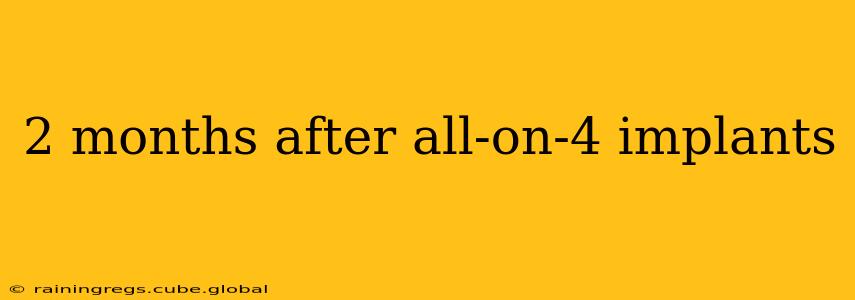Getting All-on-4 dental implants is a significant undertaking, offering the promise of a complete, functional smile. But the journey doesn't end with the surgery. The two-month mark post-procedure is a crucial stage in the healing process, characterized by noticeable improvements and ongoing care requirements. This comprehensive guide will cover what you can expect two months after your All-on-4 implant surgery, addressing common questions and concerns.
What Should I Expect Two Months After All-on-4 Implant Surgery?
At the two-month mark, most patients experience significant improvements in their comfort and functionality. The initial swelling and discomfort should have largely subsided. You'll likely notice a considerable increase in chewing ability and overall confidence in your new smile. However, the healing process is not yet complete. Bone integration, the crucial process where the implants fuse with your jawbone, continues during this phase.
While the majority of the healing is behind you, some minor residual swelling or sensitivity may persist. This is perfectly normal. The temporary prosthesis you are wearing will also likely feel more secure and comfortable.
How Tight Should My All-on-4 Implants Feel at 2 Months?
The tightness of your All-on-4 implants at two months is subjective and depends on individual healing progress and the type of prosthesis you have. It's best not to assume the tighter the better. A slight looseness or movement in the initial phases is sometimes reported. If you experience significant looseness or pain, it's crucial to contact your dentist immediately. Your dentist will be able to assess the situation and provide guidance based on your specific case.
Are All-on-4 Implants Fully Healed at 2 Months?
No, All-on-4 implants are generally not fully healed at two months. While significant healing occurs within this timeframe, the complete osseointegration (bone growth around the implants) usually takes several months, often six months or longer. This is why it is common for dentists to wait before making permanent adjustments or attaching a final permanent prosthesis.
Will My Gums Still Be Sore at 2 Months Post-Op?
Some degree of gum soreness or sensitivity can persist at two months post-op, although it should be significantly reduced compared to the initial weeks. If the soreness is severe or persistent, it’s essential to contact your dentist to rule out any complications. Regular gentle cleaning and proper oral hygiene are critical in minimizing discomfort and promoting healing.
What About Swelling and Bruising Two Months After All-on-4 Surgery?
Swelling and bruising should be minimal, if present at all, two months after surgery. If you’re still experiencing significant swelling or bruising, consult your dentist or oral surgeon. This could indicate a potential complication requiring further investigation.
Can I Eat Normally After Two Months With All-on-4 Implants?
While your ability to eat should be significantly improved, it's still advisable to avoid extremely hard or chewy foods for several more months to allow for complete healing and osseointegration. Gradually reintroduce different textures into your diet, paying close attention to any discomfort.
Can I Smoke Two Months After All-on-4 Surgery?
Smoking significantly impairs the healing process of All-on-4 implants and increases the risk of complications. It is strongly advised to refrain from smoking for several months post-surgery, if not indefinitely, to ensure optimal healing and long-term success of your implants.
What is the Aftercare for All-on-4 Implants at the 2-Month Mark?
Even at two months, diligent aftercare is still crucial. This includes:
- Maintaining excellent oral hygiene: Brush and floss gently twice daily, using a soft-bristled toothbrush and gentle flossing techniques.
- Regular dental check-ups: Attend all scheduled follow-up appointments with your dentist.
- Avoiding hard or chewy foods: Continue to eat a soft-food diet until advised otherwise by your dentist.
- Following your dentist's instructions: Adhere strictly to any specific aftercare instructions provided by your dental team.
Disclaimer: This information is for general knowledge and should not be considered medical advice. Always consult with your dentist or oral surgeon for personalized guidance regarding your All-on-4 implant treatment and aftercare. The healing process varies significantly between individuals.
